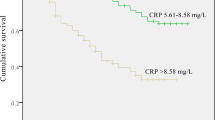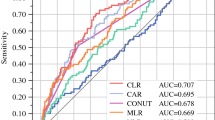Abstract
Purpose
The aim of this retrospective study was to evaluate inflammation-based scoring as a prognostic factor for operable non-small-cell lung cancer (NSCLC) in elderly patients.
Methods
We collected preoperative data from 108 patients aged above 80 years with NSCLC. Inflammation-based scoring systems, including the C-reactive protein to albumin ratio (CAR) and the Glasgow prognostic score (GPS), as well as other clinicopathological factors, were evaluated as potential prognostic factors.
Results
The median patient age was 82 (range 80–93) years and the 5-year overall and disease-specific survival rates were 49.7 and 73.9%, respectively. The cut-off value for CAR was calculated using a receiver operator characteristics analysis and patients were dichotomized accordingly. Patients with a low CAR had significantly higher overall survival than those with a high CAR (<0.028; 65.2% vs. ≥0.028; 31.0%, respectively; p < 0.01). In univariate analysis, female gender, a low Charlson comorbidity index of 0 or 1 and a low CAR were significantly identified in overall survival. On multivariate analysis, a low CAR (p = 0.03, hazard ratio: 2.13, 95% confidence interval 1.074–4.295) was identified as a significant prognostic factor.
Conclusions
The preoperative CAR is a useful predictor of overall survival and could be a simple prognostic tool to help identify resectable NSCLC in elderly patients.




Similar content being viewed by others
References
Guerra M, Neves P, Miranda J. Surgical treatment of non-small-cell lung cancer in octogenarians. Interact CardioVasc Thorac Surg. 2013;16:673–80.
Muraoka M, Oka T, Akamine S, Tagawa T, Sasaki N, Ikuta Y, et al. Surgical treatment for lung cancer in octogenarians. Surg Today. 2005;35:725–31.
Endo H, Yamamoto R, Satoh Y, Kuwano H, Nishizawa N. Risk analysis of pulmonary resection for elderly patients with lung cancer. Surg Today. 2013;43:514–20.
Okami J, Higashiyama M, Asamura H, Goya T, Koshiishi Y, Sohara Y, et al. Pulmonary resection in patients aged 80 years or over with clinical stage I non-small-cell lung cancer. Prognostic factors for overall survival and risk factors for postoperative complications. J Thorac Oncol. 2009;4:1247–53.
Mun M, Kohno T. Video-assisted thoracic surgery for clinical stage I lung cancer in octogenarians. Ann Thorac Surg. 2008;85:406–11.
Tanaka F, Yoneda K. Adjuvant therapy following surgery in non-small cell lung cancer (NSCLC). Surg Today. 2016;46:25–37.
Katayama H, Kurokawa Y, Nakamura K, Ito H, Kanemitsu Y, Masuda N, et al. Extended Clavien–Dindo classification of surgical complications: Japan Clinical Oncology Group postoperative complications criteria. Surg Today. 2016;46:668–85.
Chang JY, Senan S, Paul MA, Louie AV, Balter P, Groen HJM, et al. Stereotactic ablative radiotherapy versus lobectomy for operable stage I non-small-cell lung cancer: a pooled analysis of two randomized trials. Lancet Oncol. 2015;16:630–7.
Iwata T, Nagato K, Nakajima T, Suzuki H, Yoshida S, Yoshino I. Risk factors predictive of atrial fibrillation after lung cancer surgery. Surg Today. 2016;46:877–86.
Charlson ME, Pompei P, Ales KL, MacKenzie CR. A new method of classifying prognostic comorbidity in longitudinal studies: development and validation. J Chron Dis. 1987;40:373–83.
Kawashima M, Murakawa T, Shinozaki T, Ichinose J, Hino H, Konoeda C, et al. Significance of the Glasgow prognostic score as a prognostic indicator for lung cancer surgery. Interact CardioVasc Thorac Surg. 2015;21:637–43.
Templeton AJ, McNamara MG, Seruga B, Vera-Badillo FR, Aneja P, Ocana A, et al. Prognostic role of neutrophil-to-lymphocyte ration in solid tumors: a systematic review and meta-analysis. J Natl Cancer Inst. 2014;106:1–11.
Zhou X, Du Y, Huang Z, Xu J, Qiu T, Wang J, et al. Prognostic value of PLR in various cancers: a meta-analysis. PLoS One. 2014;9:e101119.
Kinoshita A, Onoda H, Imai N, Iwaku A, Oishi M, Tanaka K, et al. The c-reactive protein/albumin ratio, a novel inflammation-based score, predicts outcomes in patients with hepatocellular carcinoma. Ann Surg Oncol. 2015;22:803–10.
Ishizuka M, Nagata H, Takagi K, Iwasaki Y, Shibuya N, Kubota K. Clinical significance of the c-reactive protein to albumin ratio for survival after surgery for colorectal cancer. Ann Surg Oncol. 2016;23:900–7.
Xu XL, Yu HQ, Hu W, Song Q, Mao WM. A novel inflammation-based prognostic score, the c-reactive protein/albumin ratio predicts the prognosis of patients with operable esophageal squamous cell carcinoma. PLoS One. 2015;10:e0138657.
Kim MH, Ahn JY, Song JE, Choi H, Ann HW, Kim JK, et al. The C-reactive protein/albumin ratio as an independent predictor of mortality in patients with severe sepsis or septic shock treated with early goal-directed therapy. PLoS One. 2015;10:e0132109.
Ishizuka M, Nagata H, Takagi K, Horie T, Kubota K. Inflammation-based prognostic score is a novel predictor of postoperative outcome in patients with colorectal cancer. Ann Surg. 2007;246:1047–51.
Ministry of Health, Labour, and Welfare of Japan, A bridged life table 2013. Tokyo: Government of Japan; 2013. http://www.mhlw.go.jp/toukei/saikin/hw/life/life13/. Accessed 1 Feb 2016.
Saito H, Noji T, Mkamura K, Tsuchikawa T, Shichinohe T, Hirano S. A new prognostic scoring system using factors available preoperatively to predict survival after operative resection of perihilar cholangiocarcinoma. Surgery. 2016;159:842–51.
Pinato DJ, Shiner RJ, Seckl MJ, Stebbing J, Sharma R, Mauri FA. Prognostic performance of inflammation-based prognostic indices in primary operable non-small cell lung cancer. Br J Cancer. 2014;110:1930–5.
Hwang EC, Hwang IS, Yu HS, Kim SO, Jung S II, Hwang JE, et al. Utility of inflammation-based prognostic scoring in patients given systemic chemotherapy first-line for advanced inoperable bladder cancer. Jpn J Clin Oncol. 2012;42:955–60.
Lealdini V, Trufelli DC, Da Silva FBF, Normando SRC, Camargo EW, De Matos LL, et al. Applicability of modified Glasgow prognostic score in the assessment of elderly patients with cancer: a pilot study. J Geriatr Oncol. 2015;6:479–83.
McMillan DC. The systemic inflammation-based Glasgow prognostic score: a decade of experience in patients with cancer. Cancer Treat Rev. 2013;39:534–40.
Li H, Manwani B, Leng SX. Frailty, inflammation, and immunity. Aging Dis. 2011;2:466–73.
Miyazaki T, Sakai T, Tsuchiya T, Yamasaki N, Mine M, Shibata Y, et al. Assessment and follow-up of intercostal nerve damage after video-assisted thoracic surgery. Eur J Cardiothorac Surg. 2011;39:1033–9.
Author information
Authors and Affiliations
Corresponding author
Ethics declarations
Conflict of interest
We declare no competing financial conflicts of interest.
Rights and permissions
About this article
Cite this article
Miyazaki, T., Yamasaki, N., Tsuchiya, T. et al. Ratio of C-reactive protein to albumin is a prognostic factor for operable non-small-cell lung cancer in elderly patients. Surg Today 47, 836–843 (2017). https://doi.org/10.1007/s00595-016-1448-8
Received:
Accepted:
Published:
Issue Date:
DOI: https://doi.org/10.1007/s00595-016-1448-8




